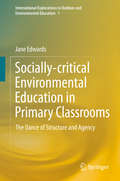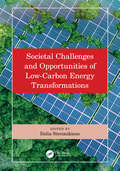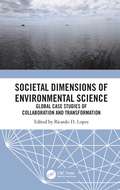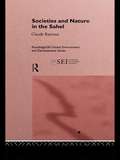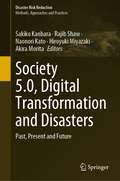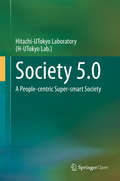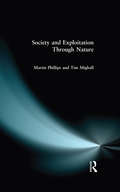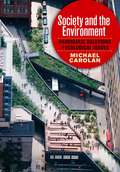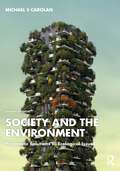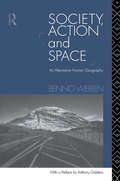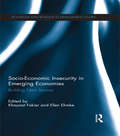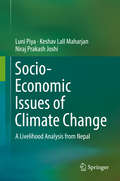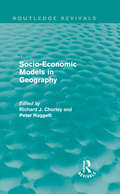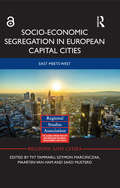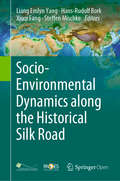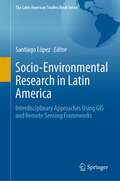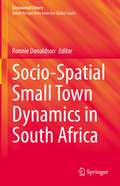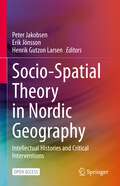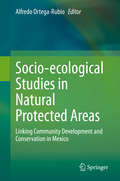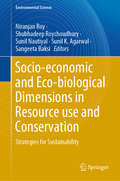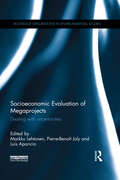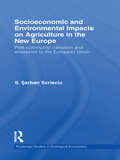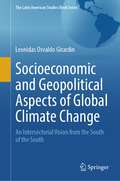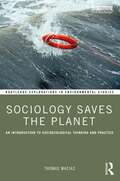- Table View
- List View
Socially-critical Environmental Education in Primary Classrooms
by Jane EdwardsThe effectiveness of Education for Sustainable Development depends on the ability of schools and teachers to embrace pedagogies that reduce the gap between the rhetoric of education for the environment and the reality of classroom practices. This book responds to the need to better understand the nature of the relationships between agency and structure that contribute to the development of educational rhetoric-reality gaps in order to inform processes that most effectively facilitate pedagogical change. This book explores the issues of pedagogical change through the experiences of Australian primary school teachers faced with the challenge of implementing an environmental education program in which young students were positioned as active participants in the social processes from which environmentally sustainable practices could be developed. These teachers were required to adopt pedagogies that often represented the antithesis of their well-established teacher-directed approaches. Through the use of Anthony Giddens' Theory of Structuration this book provides unique perspectives of the teacher mediated manner in which certain elements of structure and agency interrelate to enable and constrain classroom practices--essential understandings for school principals and educational policy developers who aim to effectively implement pedagogical change. This book also demonstrates that the Theory of Structuration provides a valuable ontological research framework, and provides social researchers with practical guidance for how to relate this theory to specific research issues.
Societal Challenges and Opportunities of Low-Carbon Energy Transformations
by Dalia StreimikieneLow-carbon energy transformations to support carbon-neutral societies is an important and urgent topic and subject to current national priorities and socio-economic planning. This book addresses the societal challenges and opportunities that come with the transition in EU member states such as energy poverty and inequality, energy security, gender inequality, energy efficiency improvements, climate change mitigation, growth in green investments, etc. It contains a balanced approach of theoretical concepts with an impressive range of relevant case studies to investigate the issues, develop indicator frameworks, identify barriers and drivers, and create policies and measures to unlock opportunities.Features: Addresses systematically and comprehensively the low-carbon energy transition, its barriers, and its societal implications. Discusses the main societal challenges and opportunities of low-carbon energy transition from theoretical and practical points of view. Provides definitions of concepts, measurement indicators, policies, and a framework for overcoming barriers and enforcing drivers. Includes case studies on low-carbon energy transition challenges and opportunities that are developed for EU countries. Encourages discussion on policies and measures necessary to overcome identified barriers and proposes how to promote a just and smooth low-carbon energy transition. This book is a great reference for academics, researchers, graduate students, and professionals such as energy producers, city planners, policymakers, etc. interested in current and emerging trends in sustainable energy.
Societal Dimensions of Environmental Science: Global Case Studies of Collaboration and Transformation
by Ricardo D. LopezSocietal Dimensions of Environmental Science: Global Case Studies of Collaboration and Transformation, brings together several key examples of the successes and the challenges that exist for environmental stakeholders trying to strike a balance between science and the societal implications of the issues involved. This book provides important methods and approaches necessary for informed decision making and a better understanding of the common threads of learning, collaboration, negotiation, and compromise. It also explains that concepts and skills needed to better understand how specific project goals can be best achieved in the rapidly changing field of environmental management, by providing practical situations and solutions, across a global landscape. This book provides anyone who works in a community setting with the necessary tools and strategies for solving environmental problems and achieving the goals of an environmental project of any type and specifically addresses the topic of how to synthesize community engagement and the environmental science. It describes current environmental issues and lessons learned of what works and what doesn’t work in real situations, and why. It also highlights key examples, which can be used by both management practitioners and research scientists in their specific circumstances. Showcasing a unique compilation of the diverse and specific examples from societies in Asia, Oceania, North America, and the Middle East, with an equally diverse array of authorship, this book serves all policy makers, scientists, organizers, and community members that desire to build better group dynamics for addressing environmental issues.
Societies and Nature in the Sahel (Routledge/SEI Global Environment and Development Series #Vol. 1)
by Philippe Lavigne Delville Emmanuel Gregoire Pierre Janin Jean Koechlin Claude RaynautThis book explores the links between environment and social systems in the Sahel, integrating ecological, demographic, economic, technical, social and cultural factors. Examining the conditions for land occupation and natural resource use, it offers a conceptual and practical approach to social organization and environmental management.
Society 5.0, Digital Transformation and Disasters: Past, Present and Future (Disaster Risk Reduction)
by Rajib Shaw Sakiko Kanbara Hiroyuki Miyazaki Naonori Kato Akira MoritaThis book presents the evolution of the science technology paradigm in Japan and analyzes the critical community and local governance issues from the perspectives of the changing risk landscape, Society 5.0, and digital transformation. It also provides suggestions for the future development of a resilient society and community, by drawing lessons from other countries.Advancements in science technology in recent decades in Japan and the world might have increased our capacity to tackle the adverse human consequences of various kinds of disasters and environmental issues. However, the accompanied and interlinking phenomena of urbanization, climate change, rural to urban migration, population decreases, and aged population have posed new challenges, especially in the small, medium-sized cities, and in rural areas of Japan. This is also enhanced by the risk of cascading, complex and systemic risk, which is defining a new normal as “living with uncertainties”.Society 5.0 is defined as "A human-centered society that balances economic advancement with the resolution of social problems by a system that highly integrates cyberspace and physical space." Society 5.0 was proposed in the 5th Science and Technology Basic Plan as a future society that Japan should aspire to. Society 5.0 achieves a high degree of convergence between cyberspace (virtual space) and physical space (real space), compared with the past information society (Society 4.0) that people would access a cloud service (databases) in cyberspace via the Internet and search for, retrieve, and analyze information or data.In Japan, in the initial stage, a great deal of confusion about the number of people infected with coronavirus occurred. Not only made it inefficient, but it did not produce the accurate data needed for critical decisions.Japan may have unique disadvantages compared with other countries. Trying to drive digitization without thoroughly understanding these disadvantages and addressing them head-on will only lead to failed digital transformations.With these three pillars of changing risk landscape, Society 5.0, and Digital transformation drive, the book will analyze the evolution of the science technology paradigm in Japan, will go deeper into the critical community and local governance issues, and will provide suggestions for future development of resilient society and community, by drawing lessons from overseas disaster risk reduction.
Society 5.0: A People-centric Super-smart Society
by Hitachi-UTokyo LaboratoryThis open access book introduces readers to the vision on future cities and urban lives in connection with “Society 5.0”, which was proposed in the 5th Basic Science and Technology Plan by Japan’s national government for a technology-based, human-centered society, emerging from the fourth industrial revolution. The respective chapters summarize the findings and suggestions of joint research projects conducted by H-UTokyo Lab. Through the research collaboration and discussion, this book explores the future urban lives under the concept of “Society 5.0”, characterized by the key phrases of data-driven society, knowledge-intensive society, and non-monetary society, and suggests the directionality to which the concept should aim as Japan’s technology-led national vision. Written by Hitachi’s researchers as well as academics from a wide range of fields, including engineering, economics, psychology and philosophy at The University of Tokyo, the book is a must read for members of the general public interested in urban planning, students, professionals and researchers in engineering and economics.
Society and Exploitation Through Nature
by Martin Phillips Tim MighallSociety and Exploitation Through Nature offers an integrated approach to the environment, linking the philosophical, social and physical sciences to environmental problems and issues. The text covers three main themes; exploitation of nature and society; the limits of exploitation through sustainability and managing environmental problems. These themes are illustrated throughout the book with global case studies.
Society and the Environment
by Michael CarolanTalking about global environmental issues need not be an exercise in gloom, doom, and individual sacrifice-as Michael Carolan ably demonstrates in this introduction to environmental sociology.Society and the Environment examines today's environmental controversies within a socio-organizational context. After outlining the contours of "pragmatic environmentalism," Carolan explores the material world: air, water, biodiversity, and trash. He considers the pressures that exist where ecology and society collide, such as population growth and its associated increased demands for food and energy. Finally, he drills into the social/structural dynamics-including political economy and the international legal system-that create ongoing momentum for environmental ills.This interdisciplinary text features a three-part structure in each chapter that covers "fast facts" about the issue at hand, examines its wide-ranging implications, and offers pragmatic consideration of possible real-world solutions. Bolstering the analysis, a variety of boxes highlight relevant case studies as well as the value judgments which lurk everywhere in talk about environmental phenomena. Discussion questions and key terms enhance the text's usefulness, making Society and the Environment the perfect learning tool for courses on environmental sociology.
Society and the Environment
by Michael CarolanTalking about global environmental issues need not be an exercise in gloom, doom, and individual sacrifice--as Michael Carolan ably demonstrates in this introduction to environmental sociology. Society and the Environment examines today's environmental controversies within a socio-organizational context. After outlining the contours of "pragmatic environmentalism," Carolan explores the material world: air, water, biodiversity, and trash. He considers the pressures that exist where ecology and society collide, such as population growth and its associated increased demands for food and energy. Finally, he drills into the social/structural dynamics--including political economy and the international legal system--that create ongoing momentum for environmental ills. This interdisciplinary text features a three-part structure in each chapter that covers "fast facts" about the issue at hand, examines its wide-ranging implications, and offers pragmatic consideration of possible real-world solutions. Bolstering the analysis, a variety of boxes highlight relevant case studies as well as the value judgments which lurk everywhere in talk about environmental phenomena. Discussion questions and key terms enhance the text's usefulness, making Society and the Environment the perfect learning tool for courses on environmental sociology.
Society and the Environment: Pragmatic Solutions to Ecological Issues
by Michael S CarolanThe fourth edition of Society and the Environment centers its discussion on realistic solutions to the problems that persist and examines current controversies within a socio‑organizational context, shifting focus away from simply explaining what is wrong with the world around us. Introducing this “pragmatic environmentalism,” Carolan discusses the complex pressures and variables that exist where ecology and society collide, with population growth, the increase in demands for food and energy, and transportation and its outsized influence on urban and community patterns. With further attention given to the social phenomena and structural dynamics driving today’s environmental problems, the book concludes with an important reflection on truly sustainable solutions and what constitutes meaningful social change.Each chapter in this interdisciplinary text follows a three‑part structure beginning with an overview of what is wrong and why. This leads into a discussion on each issue’s wide‑ranging implications and, finally, a balanced consideration of realistic solutions. Featuring updated and expanded examples, discussion points, and coverage of recent developments, including the US withdrawing from the Paris Agreement, “booming” national economies and wealth distribution, growing global interest in environmental justice—with particular focus on the links between injustice and race and inequality—climate change, and renewable energy, this new edition remains an essential companion for courses on environmental sociology and sustainability.
Society, Action and Space
by Benno WerlenThis is the first English translation of a book which has been widely recognized in Europe as a major contribution to the interface between geography and social theory. Ambitious, crackling with original ideas and persuasively argued, it raises exciting new implications for the study of space and social theory.
Socio-Economic Insecurity in Emerging Economies: Building new spaces (Routledge Explorations in Development Studies)
by Khayaat Fakier Ellen EhmkeTaking a unique comparative approach to the respective development paths of India, Brazil and South Africa (IBSA), this book shows that people and governments in all three countries are faced with similar challenges of heightened insecurity, caused by liberalization and structural adjustment. The ways in which governments, as well as individuals and worker organisations in IBSA have responded to these challenges are at the core of this book. The book explores the nature of insecurity in the Global South; the nature of the responses to this insecurity on public and small-scale collective as well as individual level; the potential of these responses to be more than neo-liberal mechanisms to govern and contain the poor and lessons to be learnt from these three countries. The first section covers livelihood strategies in urban and rural areas as individual and small-scale collective response to the condition of insecurity. Insecurity in the countries of the South is characterised by a high degree of uncertainty of the availability of income opportunities. The second section looks at state responses to insecurity and contributions on social protection measures taken by the respective IBSA governments. The third section discusses whether alternative development paths can be identified. The aim is to move beyond ‘denunciatory analysis.’ Livelihood strategies as well as public policies in some of the cases allow for the building of new spaces for agency and contestation of a neo-liberal mainstream which provide emerging and experimental examples. The book develops new thinking on Northern welfare states and their declining trade unions. It argues that these concepts, knowledge and policy innovations are now travelling in three directions, from North to South, from South to North, and between Southern countries. This book provides unique insights for researchers and postgraduate students in development studies, social policy and industrial sociology.
Socio-Economic Issues of Climate Change: A Livelihood Analysis from Nepal
by Keshav Lall Maharjan Niraj Prakash Joshi Luni PiyaThis book conducts a holistic analysis of climate change perceptions, vulnerabilities, impacts, and adaptation, based on the primary household-data collected from the Chepang community residing in the rural Mid-Hills of Nepal. Socio-economic and demographic data from the household survey is integrated with meteorological and spatial data to conduct an integrated analysis. Quantitative analysis is also supplemented by qualitative information. Given the context of ongoing climate change, the livelihoods issues of a highly marginalized Chepang community form the center-point of analysis. The book demonstrates that balanced assets possession is a prerequisite to strengthen the adaptive capacity of the households. Furthermore, the ability of translating adaptive capacity into adaptation actions is determined by the households’ ability to correctly perceive the changes and their access to various assets. The book recommends to ensure the availability of non-farm livelihood opportunities along with access to formal/vocational education and skill development training as these are the key factors contributing to reduce the vulnerability. The book concludes that mainstreaming of climate change into development efforts is a must for sustainable development.
Socio-Economic Models in Geography (Routledge Revivals)
by Richard J. Chorley and Peter HaggettFirst published in 1968, this book explores the theme of geographical generalization, or model building. It is composed of seven of the chapters from the original Models in Geography, published in 1967. The first chapter broadly outlines this theme and examines the nature and function of generalized statements, ranging from conceptual models to scale models, in a geographical context. The following six chapters deal with socio-economic building in geography. They focus on demographic and sociological models as well as looking at special aspects of models in human geography in reference to economic development, urban geography and settlement location, industrial location, and agricultural activity. This book represents a robustly anti-idiographic statement of modern work in one of the major branches of geography.
Socio-Economic Segregation in European Capital Cities: East Meets West (Regions and Cities)
by Sako Musterd Maarten Van Ham Tiit Tammaru Szymon MarcińczakGrowing inequalities in Europe are a major challenge threatening the sustainability of urban communities and the competiveness of European cities. While the levels of socio-economic segregation in European cities are still modest compared to some parts of the world, the poor are increasingly concentrating spatially within capital cities across Europe. An overlooked area of research, this book offers a systematic and representative account of the spatial dimension of rising inequalities in Europe. This book provides rigorous comparative evidence on socio-economic segregation from 13 European cities. Cities include Amsterdam, Athens, Budapest, London, Milan, Madrid, Oslo, Prague, Riga, Stockholm, Tallinn, Vienna and Vilnius. Comparing 2001 and 2011, this multi-factor approach links segregation to four underlying universal structural factors: social inequalities, global city status, welfare regimes and housing systems. Hypothetical segregation levels derived from those factors are compared to actual segregation levels in all cities. Each chapter provides an in-depth and context sensitive discussion of the unique features shaping inequalities and segregation in the case study cities. The main conclusion of the book is that the spatial gap between the poor and the rich is widening in capital cities across Europe, which threatens to harm the social stability of European cities. This book will be a key reference on increasing segregation and will provide valuable insights to students, researchers and policy makers who are interested in the spatial dimension of social inequality in European cities. A PDF version of the introduction and conclusion are available Open Access at www.tandfebooks.com. It has been made available under a Creative Commons Attribution-Non Commercial-No Derivatives 3.0 license.
Socio-Environmental Dynamics along the Historical Silk Road
by Liang Emlyn Yang Hans-Rudolf Bork Xiuqi Fang Steffen MischkeThis open access book discusses socio-environmental interactions in the middle to late Holocene, covering specific areas along the ancient Silk Road regions. Over twenty chapters provide insight into this topic from various disciplinary angles and perspectives, ranging from archaeology, paleoclimatology, antiquity, historical geography, agriculture, carving art and literacy. The Silk Road is a modern concept for an ancient network of trade routes that for centuries facilitated and intensified processes of cultural interaction and goods exchange between West China, Central Asia, the Middle East, and the Mediterranean. Coherent patterns and synchronous events in history suggest possible links between social upheaval, resource utilization and climate or environment forces along the Silk Road and in a broader area. Post-graduates in studying will benefit from this work, as well as it will stimulate young researchers to further explore the role played by the environment in long-term socio-cultural changes.
Socio-Environmental Research in Latin America: Interdisciplinary Approaches Using GIS and Remote Sensing Frameworks (The Latin American Studies Book Series)
by Santiago LópezThis contributed volume presents relevant examples of socio-environmental research that highlight the challenges and opportunities of using geotechnologies in interdisciplinary settings across the vast, culturally, and environmentally mega-diverse region known as Latin America. While remote sensing has been mostly used for mapping and monitoring physical features, geographic information systems open up opportunities for the integration of socio-economic and environmental data collected through individual and community-based surveys, in-situ measurements, and other participatory research techniques to offer additional analytically grounded power when evaluating socio-environmental processes that shape Latin American landscapes. The topics addressed in this book include deforestation and land degradation, borderlands dynamics, agriculture and agroecological systems, environmental conservation and development, public health, tourism, environmental justice, archeology, volunteered geography and urban planning, among others. The book is intended for academics, graduate and undergraduate classrooms, and general audiences with interest in Latin America and the socio-environmental issues that threaten the sustainability of the region and local communities. The book will also appeal to practitioners, managers, and policy makers interested in the application of geo-technologies and field-based research to address complex socio-environmental problems in the Global South.
Socio-Spatial Small Town Dynamics in South Africa (GeoJournal Library)
by Ronnie DonaldsonThis book explores small town geographical aspects by approaching them from a socio-spatial perspective. The contributions included in this book delve into a range of topics that have not been commonly studied before, such as white privilege, neglect of municipal infrastructure, collaborative governance, livelihoods in small-scale fisheries, housing provision, well-being in mining towns, studentification in rural contexts, election trends, and the historical development of small-town spas. The book adopts a socio-spatial point of view, providing a holistic understanding of the interplay between social and spatial factors within selected small town case studies. This approach sheds light on the socio-economic, political, and cultural dynamics that shape small towns. This localized perspective allows for a more targeted analysis of issues and potential solutions, taking into account the specific historical, cultural, and political contexts of small town South Africa. The edited volume serves as a valuable resource for academics, policymakers, practitioners, and anyone interested in understanding and improving small towns in South Africa.
Socio-Spatial Theory in Nordic Geography: Intellectual Histories and Critical Interventions
by Henrik Gutzon Larsen Peter Jakobsen Erik JönssonThis open access book is about socio-spatial theory in, and the nature of, Nordic geography. From both historical and contemporary perspectives, the book engages with theorisations of geography in the Nordic countries. Including chapters by geographers from Denmark, Finland, Iceland, Norway and Sweden, it reflects how theories about the relations between the social and the spatial have been developed, adopted and critiqued in Nordic human geography in relation to a wide range of themes, concepts and approaches. The book also traces institutional developments, distinct geographical traditions and intellectual histories, as well as authors’ own experiences as geographers in and beyond the Nordic area. The chapters together introduce and engage with debates and discussions that permeate Nordic geography and allows readers a glimpse of geographical thinking and the role of socio-spatial theory in the Nordic countries. By providing insights into how geographical ideas emerge, travel and are translated and adapted in specific contexts, the book contributes to debates about historical-geographical situatedness and theorisations of geography.
Socio-ecological Studies in Natural Protected Areas: Linking Community Development and Conservation in Mexico
by Alfredo Ortega-RubioThis book explores the interactions of local inhabitants and environmental systems in the Protected Natural Areas of Mexico. Its goal is to help understand how social groups contextualize ecological knowledge, how human activities contribute to modifying the environmental matrix, how cultural and economic aspects influence the use, management and conservation of their ecological environment, and how social phenomena are to be viewed against the backdrop of ecological knowledge.The book reviews the epistemological and historical bases of the socio-ecological relationship, and addresses the evolution of human-natural systems. From a methodological standpoint, it assesses the tools required for the integration of “human” and “natural” dimensions in the management of the environmental matrix. Further, in the case studies section, it reviews valuable recent experiences concerning the retro-interactions of local inhabitants with their environmental matrix. Given its scope, the book offers a valuable asset for researchers and professionals all over the world, especially those working in Latin American countries.
Socio-economic and Eco-biological Dimensions in Resource use and Conservation: Strategies for Sustainability (Environmental Science and Engineering)
by Sunil Nautiyal Niranjan Roy Shubhadeep Roychoudhury Sunil K. Agarwal Sangeeta BaksiThis book presents the outcomes of the 2017 national workshop and international conference organized by CEENR of ISEC, Bengaluru and Assam University Silchar. Addressing the threats to biodiversity and sustainable development resulting from the impacts of human induced pressures on ecosystems and global-warming-driven climate change is a major challenge. It requires increased knowledge and an enhanced information base in order to devise local policies to improve the adaptive capacity of vulnerable socio-ecological systems in developing countries. In this context, the book presents research that has the potential to benefit the environment and empower communities. It appeals to researchers investigating diverse aspects of socio-ecological-biological systems to create strategies for resource use, conservation and management to ensure sustainability.
Socioeconomic Evaluation of Megaprojects: Dealing with uncertainties (Routledge Explorations in Environmental Studies)
by Markku Lehtonen Pierre-Benoît Joly Luis AparicioThe governance and evaluation of ‘megaprojects’ – that is, large-scale, complex, high-stakes infrastructure projects usually commissioned by governments and delivered through partnerships between public and private organisations – is receiving increased attention. However, megaproject evaluation has hitherto largely adopted a linear-rationalist perspective to explain the frequent failure of such projects to meet the ‘iron triangle’ of performance criteria: delivering on time, within budget, and according to specifications. This approach recommends greater control and accountability to remedy megaproject ‘pathologies’. Drawing on empirical examples mainly from the transport sector and radioactive waste disposal, this book offers new perspectives to megaproject evaluation. Comprising contributions from leading experts in project evaluation and appraisal, this collection opens up new avenues by suggesting two ways of improving megaproject evaluation: 1) approaches that go beyond the dominant linearrationalist notion of policy processes, and emphasise instead the objective of opening up appraisal processes in order to enhance learning and reflexivity; and 2) approaches that extend evaluative criteria beyond the ‘iron triangle’, to cover the various socioeconomic impacts and preconditions for project success. This volume will be of great relevance to scholars and practitioners with an interest in megaprojects, energy and climate policy, radioactive waste management, urban design, and project planning and management.
Socioeconomic and Environmental Impacts on Agriculture in the New Europe: Post-Communist Transition and Accession to the European Union
by S. Serban ScrieciuThis book looks at agriculture and the environment, placed within the dynamic context of post-communist societal change and entry into the European Union (EU). Scrieciu explores developments in eleven Central and Eastern European (CEE) countries and argues for agriculture’s natural place in these societies. The history of these countries is significant in how it has shaped the institutions and influenced the outcomes. In many cases, during communism, agriculture was not considered a strategically. An ecological consciousness did not figure high on the agendas of authoritarian regimes. After 1990, some post-communist farm economies progressed slower than others, and environmental pressures mostly diminished with agricultural restructuring. In parts of CEE, increases in numbers of low-input small farms have resulted in some, though largely unintended, ecological benefits. A dual environmental challenge has nevertheless surfaced. On one hand, environmentally unsustainable practices have been attributed to some low-input farming. On the other hand, risks of farm over-intensification and resource overexploitation are on the rise. Also, environmental regulatory and institutional frameworks are not always effectively in place. EU membership is not creating the anticipated benefits for farm growth. There are a number of systemic structural barriers preventing many farmers from drawing on Common Agricultural Policy incentives and support. The presence of many vulnerable poor farms is clearly problematic, particularly economically. However, small-scale farms could be made more acceptable and profitable by ensuring EU policies acknowledge their value and by building institutions to support alternative farm growth strategies, aside from the traditional European model of individual corporate farm expansion. The voluntary uptake of grassroots rural cooperation and farm associations may represent such an alternative. Future European farm policy reforms need to reach the small and vulnerable, and better tackle issues of farm equity, poverty, and agricultural sustainability in the new Europe. This is a timely contribution as this type of "transition" has just begun. This book should be of use to students and researchers looking at agricultural and environmental economics, post-communist rural societal change, European integration and the Common Agricultural Policy.
Socioeconomic and Geopolitical Aspects of Global Climate Change: An Intersectorial Vision from the South of the South (The Latin American Studies Book Series)
by Leonidas Osvaldo GirardinThis book discusses climate change from an academic point of view centered on and from Latin America. Although climate change is a global issue, there has been a notable lack of input from the Latin American perspective, which means that many Latin American intellectuals often bring ideas, tools and potential solutions proposed by external, international research centers or organizations to the region. This book embraces a Latin American viewpoint to critically engage the problem and many of the concepts used in the analysis of climate change.The text emphasizes heterogeneity as an essential factor that cannot be absent in the analysis of how to understand and face the challenges posed by climate change. This heterogeneity refers not only to the magnitude of the impact that different regions will experience (including in their productive activities, ecosystems and social groups), but also to their contexts and capacities. Different countries' and regions' historical accumulated emissions—the primary cause of the current atmospheric concentrations of greenhouse gases—can inform current responsibilities, and their diverse productive structures will also contribute to different baselines in energy, agriculture and other sectors. Asymmetries in economic, technological and political capacities to face climate-related challenges will influence the social and economic costs of potential adaptation and mitigation measures.Using this conceptual approach, the book focuses on some of the main climate change-linked impacts expected in the region, such as effects on semi-arid ecosystems, and feasible, sector-specific adaptation measures. Furthermore, it contextualizes mitigation measures that appear on the international agenda (including the utilization of economic instruments to flexibilize the fulfillment of climate commitments) in the Latin American region.Socioeconomic and Geopolitical Aspects of Global Climate Change: An Intersectorial Vision from the South of the South offers socioeconomic and geopolitical analysis from the perspective of a region that is going to suffer impacts disproportionately greater than its historical and current responsibility in triggering this global environmental threat.
Sociology Saves the Planet: An Introduction to Socioecological Thinking and Practice (Routledge Explorations in Environmental Studies)
by Thomas MaciasHighlighting how the environment and society are intrinsically linked, this book argues that environmental concerns need to be treated as a core concept in the study of sociology. Given its focus on inequality and the constituent elements of the social world, sociology has often been accused of negligence regarding the urgency of the world’s environmental crisis. Sociology Saves the Planet corrects this mis-perception by integrating the theme of environment and society to highlight the intrinsic value a sociological perspective brings to our understanding of the current ecological crisis. The author first draws out the origins of sociology in the social and ecological transformations of the industrial revolution. In accounting for the social upheavals of the 19th century, Emile Durkheim, Karl Marx, and Max Weber all provided key insights into the changing nature of human organization and exploitation of the natural world. Second, readers will explore sociological perspectives developed since that time, grounded in evidence-based research, which highlight the inextricable connection between environment and society. Special attention is devoted to the dual role of people as producers and consumers in the modern context. Lastly, this book examines the significance of major categories of social difference regarding the current environmental crisis. In that regard the question of environmental justice is paramount, illuminating both the disproportionate benefit of natural resource exploitation to those countries and individuals with higher socioeconomic status, and the greater exposure to environmental hazard among those with less. Averting global calamity requires we recognize the unequal social impacts of the environmental crisis while valorizing inclusivity and the diversity of human experience in our search for solutions. Designed for introductory courses, this book is essential reading for sociology students and will be of interest to students and academics studying environment and sustainability more broadly.
